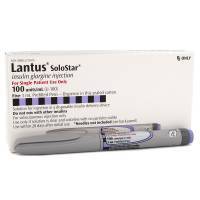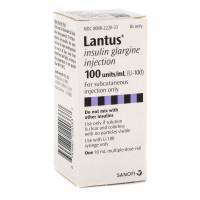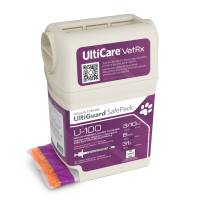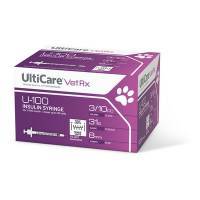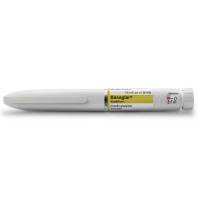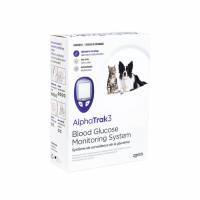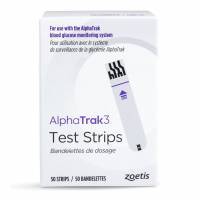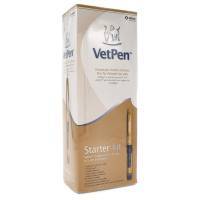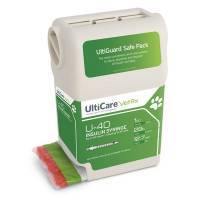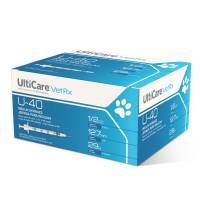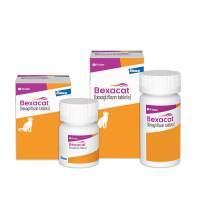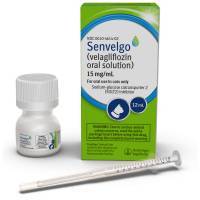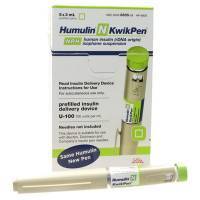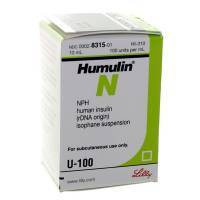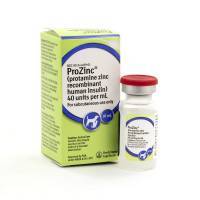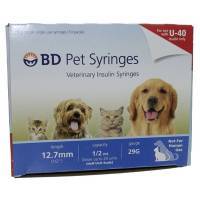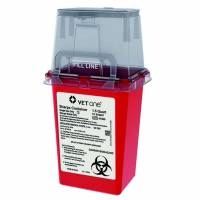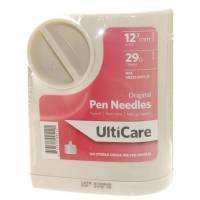Diabetes in Pets
Diabetes is a long-lasting health condition that affects how the body turns food into energy. The pancreas releases insulin to convert dietary sugar to energy. Dogs and cats diagnosed with diabetes can't make enough insulin or their bodies can't use it as well as they should. Diabetes is treatable and can be managed successfully in dogs and cats. Regular veterinary check-ups are needed to help maintain your dog or cat's condition. Treatment methods may include blood glucose tests, dietary changes, insulin injections, or other medications.
At VetRxDirect, you can find a wide selection of diabetes care products for your dog or cat. The AlphaTrak Blood Glucose Monitor is a complete system for testing and recording your dog or cat's blood glucose levels. The AlphaTrak Meter Starter Kit includes everything you need to test your pet's blood glucose and begin managing your pet's diabetes at home. The UltiCare Syringes have a large combination of needle and syringe sizes in both U-40 and U-100. The UltiCare and ProZinc Syringe Kits offer a sharps container for all-in-one storage and disposal. Other popular insulin syringe brands include VetriJec and BD Pet Syringes. Home Sharps Containers are also available and provide a safe method to deposit and store used needles, syringes, and pen needles. VetRxDirect Pharmacy carries a range of diabetes medications, including insulin for dogs and cats. Lantus, Vetsulin, ProZinc, Basaglar, Novolin, Levemir, and Humulin are some of the most commonly prescribed brands.
For dogs and cats prescribed insulin, there are some special notes to know:
Insulin pens hold multiple doses of insulin. Pen needles attach and detach from the top of the pen for each injection.
Traditional insulin is drawn out of a vial using an insulin syringe.
Insulin syringes are sized based on the type of insulin, U-100, and U-40.
Best Selling Diabetes in Pets Products
Frequently Asked Questions
Insulin syringes have an attached needle, and the size of a needle is usually measured by gauge and length. The gauge number describes how thick a needle is, and the higher the number, the thinner the needle.
- For example, a 32g needle is thinner than a 28g needle.
Thinner needles are usually more comfortable for injection, and thicker needles are more durable. The length of the needle is measured in inches and is usually based on personal preference and skin thickness.
- Needles typically come in 28g, 29g, 31g, and 1/2 in or 5/16 in, depending on the manufacturer.
Learn more about Choosing Pet Insulin Syringes
Insulin for animals usually comes in two different concentrations: 40 units/mL and 100 units/mL. Depending on the brand of insulin, the concentration may be written on the bottle as 100 units/mL, U-100, 100 IU, or 40 units/mL, U-40, 40 IU. When selecting syringes to use with your pet’s insulin, you want to make sure they match the concentration; otherwise, your pet will receive the wrong dose. This is because the syringes have different dosage markings.
- For example: if you have Lantus 100 units/mL, you will need U-100 syringes.
- For example: if you have Vetsulin 40 units/mL you will need U-40 syringes.
If you are unsure of the concentration of your pet’s insulin, talk to your veterinarian.
Pen needles are specifically designed to attach and detach from the top of an insulin pen for each injection.
- Insulin pens are devices that hold multiple doses of insulin inside a chamber and can be reused.
Learn more about How to Choose Insulin Pen Needles for Pets
It is recommended that all needles and insulin syringes be placed into a sharps container immediately after they have been used. This will reduce the risk of needle sticks, cuts, and punctures from loose sharps. Sharps disposal containers should be kept out of reach of children and pets.
- Some manufacturers provide sharps containers packaged with your supply of insulin syringes.
- Home Sharps Containers are available and provide a safe method to deposit and store used needles, syringes, and pen needles.
Follow your community guidelines for getting rid of the container. Sharps disposal guidelines and programs vary depending on where you live. Check with your local trash removal services or health department to see which disposal methods are available in your area. Learn more about sharps disposal.
The total capacity of an insulin syringe is measured by cc or mL. The size of the syringe will depend on how much insulin is needed for the dose. Syringes are also labeled with dosage markings, either in full or half-unit increments. Syringes typically come in 3/10 cc, 1/2 cc , and 1cc sizes.
Talk with your veterinarian about which needle and syringe type will work best for you and your pet.
Related Blog Content
Bexacat and Senvelgo: The New Treatments for Cat Diabetes
Posted on May 23, 2024 by Holly
New Diabetes Medications for Cats The FDA has approved two new drugs, Bexacat and Senvelgo, to treat diabetes mellitus (high blood sugar) in cats. Unlike traditional insulin shots, these medications are given by mouth, making treatment easier for diabetic cat … Continue reading
Posted in Diabetes in Pets | Tagged bexacat cat diabetes Diabetes in cats Diabetes in Pets diabetes medication for cats senvelgo
ProZinc Insulin Approved to Treat Dogs with Diabetes
Posted on January 27, 2021 by Holly
ProZinc Insulin for Dogs The U.S. Food and Drug Administration (FDA) has announced ProZinc Insulin approval for managing diabetes mellitus in dogs. ProZinc is a type of human insulin called protamine zinc recombinant human insulin. Insulin is a natural hormone that … Continue reading
Posted in Diabetes in Pets | Tagged Diabetes in dogs Diabetes in Pets dog diabetes dog insulin insulin for dogs Prozinc prozinc for dogs prozinc insulin
Understanding Diabetes Mellitus in Cats
Posted on November 8, 2018 by Holly
November marks National Pet Diabetes Month. This pet health awareness event is designed to spread the word and encourage dog and cat owners to learn more about diabetes. Diabetes mellitus occurs when the body does not produce enough insulin, stops … Continue reading
Posted in Diabetes in Pets | Tagged A1C test for cats A1Care cat diabetes Diabetes in cats Diabetes in Pets diabetes testing for cats insulin for cats pet diabetes month
Understanding Diabetes Mellitus in Dogs
Posted on November 8, 2018 by Holly
November marks National Pet Diabetes Month. This pet health awareness event is designed to spread the word and encourage dog and cat owners to learn more about diabetes. Diabetes mellitus occurs when the body does not produce enough insulin, stops … Continue reading
Posted in Diabetes in Pets | Tagged A1C test for dogs A1Care Diabetes in dogs Diabetes in Pets diabetes testing for dogs dog diabetes insulin for dogs pet diabetes month

